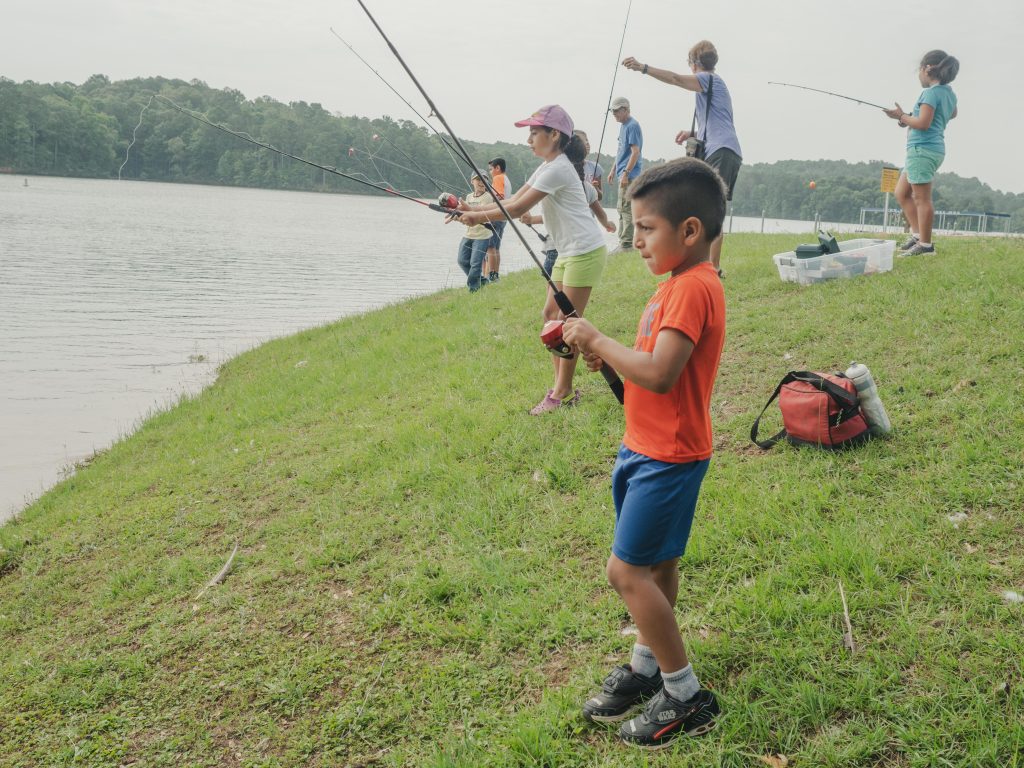Fish Advisories In Spanish
Alabama Fish Consumption Advisories Now Available in Spanish
Waterkeepers Alabama addresses language barriers in Alabama’s fish consumption advisories to ensure that every family has access to this critical public health information
FOR IMMEDIATE RELEASE: October 15, 2022
Contact: Charles Scribner, Executive Director, Black Warrior Riverkeeper, [email protected], 205-458-0095
ALABAMA – Waterkeepers Alabama members have updated their popular statewide toll-free fish consumption advisory hotline in Spanish and in English, the first of its kind in Alabama. The Alabama Department of Public Health, the entity in charge of releasing the advisories, annually releases the advisories in English and on an online document, not accounting for any language, literacy, or technological barriers. After four years of only being available in English, Spanish-speaking communities can now call 844-219-7475 and hear the state-issued consumption recommendations for every waterway in Alabama in Spanish at the end of each extension.
Earlier this summer, the Alabama Department of Public Health released its annual fish consumption advisories, which highlight the state’s recommended limits on the consumption of different species of fish found in Alabama’s rivers and streams. There are 227 advisories issued across 158 waterbodies in Alabama, including 19 advisories in the Black Warrior River basin. After catching and testing certain types of fish, the state issues the consumption advisories to warn anglers not to consume fish that are contaminated with dangerous pollutants like polychlorinated biphenyls (PCBs) and methylmercury.
Many of the advisories warn the public not to eat any fish from the specific waterbody, while others recommend limiting exposure to one or two meals per month. Given how important this public health information is for families relying on the river for sustenance, Waterkeepers Alabama decided to invest its own time and resources to translate its resources into Spanish.
“This Waterkeepers Alabama collaboration is pivotal for bringing fish consumption information to more Alabamians,” said Charles Scribner, Executive Director of Black Warrior Riverkeeper. “We are grateful to UAB, CatchaFire, and Cristina Almanza, a member of Black Warrior Riverkeeper’s Advisory Council, for helping us translate the advisories, create new graphics, and update our resources in Spanish.”
In addition to the statewide fish consumption advisory hotline, Waterkeepers Alabama’s partners have been working to translate frequently asked questions, forms to report pollution, safe swimming tips, and more to ensure the Hispanic and Latino populations in Alabama can know how to recreate safely in Alabama. Waterkeepers Alabama has already identified more gaps in this critical public health material and already has begun more projects to help the Hispanic and Latino communities across Alabama.
“No matter who you are or what you look like, you deserve to know this critical public health information,” said Abby Brown, Coosa Riverkeeper’s Outreach Manager and Waterkeepers Alabama’s Social Media Chair. “These advisories are for known harmful contaminants and the public should be able to find this information quickly and easily to prevent unknowingly consuming harmful contaminants while eating fish,”
To learn more about the toxins in our fish and rivers, ways to reduce your exposure, and for more information about Fish Guide, please visit WaterkeeperAlabama.org/Fish.
For Chattahoochee Riverkeeper’s picture of fishers in the Chattahoochee River basin, click here.
# # #
Waterkeepers Alabama is a regional entity of Waterkeepers Alliance launched in 2018 to further connect and support Waterkeeper organizations on waterways that flow through and across Alabama.
Black Warrior Riverkeeper’s mission is to protect and restore the Black Warrior River and its tributaries. The nonprofit organization promotes clean water for improved public health, recreation, and wildlife habitat throughout the Black Warrior River watershed.

Fishing in the Chattahoochee River basin. Photo by Chattahoochee Riverkeeper.












